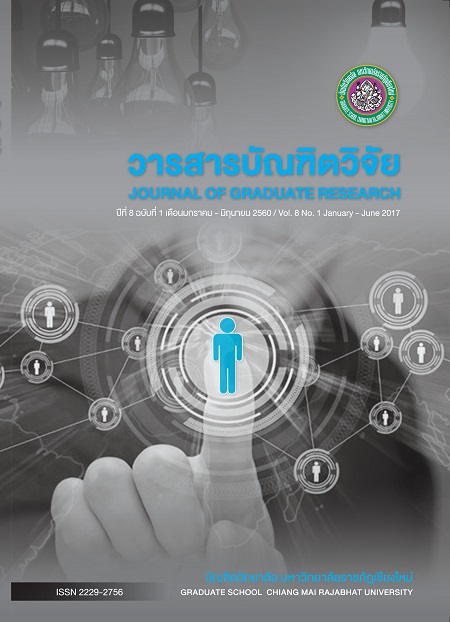ผลการจัดประสบการณ์ตามแนวการสอนภาษาแบบธรรมชาติที่มีต่อพัฒนาการทางภาษาด้านทักษะการฟังและทักษะการพูดของเด็กปฐมวัย ที่ใช้ภาษาไทยเป็นภาษาที่สอง
Main Article Content
บทคัดย่อ
การวิจัยครั้งนี้มีวัตถุประสงค์เพื่อศึกษาพัฒนาการทางภาษาด้านทักษะการฟังและทักษะการพูดของเด็กปฐมวัยที่ใช้ภาษาไทยเป็นภาษาที่สองโดยการจัดประสบการณ์ตามแนวการสอนภาษาแบบธรรมชาติ ประชากรที่ใช้ในการวิจัยครั้งนี้ ได้แก่ เด็กปฐมวัยที่ใช้ภาษาไทยเป็นภาษาที่สอง ซึ่งกำลังศึกษาอยู่ชั้นอนุบาลปีที่ 2 ภาคเรียนที่ 2ปีการศึกษา 2558 โรงเรียนบ้านใหม่สุขสันต์ สังกัดสำนักงานเขตพื้นที่การศึกษาประถมศึกษาเชียงราย เขต 4 จำนวน 16 คน เครื่องมือที่ใช้ในการวิจัยในครั้งนี้ ประกอบด้วย แผนการจัดประสบการณ์ตามแนวการสอนภาษาแบบธรรมชาติ แบบประเมินพัฒนาการทางภาษาด้านทักษะการฟัง และแบบประเมินพัฒนาการทางภาษาด้านทักษะการพูด สถิติที่ใช้ในการวิเคราะห์ข้อมูล คือ การหาค่าเฉลี่ย (µ) ส่วนเบี่ยงเบนมาตรฐาน (σ) และค่าร้อยละ
ผลการวิจัยพบว่า เด็กปฐมวัยที่ใช้ภาษาไทยเป็นภาษาที่สองที่ได้รับการจัดประสบการณ์ตามแนวการสอนภาษาแบบธรรมชาติหลังได้รับการจัดประสบการณ์ มีค่าเฉลี่ยของพัฒนาการทางภาษาด้านการฟังและการพูดสูงกว่าก่อนได้รับการจัดประสบการณ์ เท่ากับ 23.33 และ 17.27 คิดเป็นร้อยละ 23.33 และ 17.27 ตามลำดับ โดยมีคะแนนเฉลี่ยพัฒนาการทางภาษาด้านการฟังและการพูดของนักเรียนชั้นอนุบาลปีที่ 2 ที่ใช้ภาษาไทยเป็นภาษาที่สองเท่ากับ 24.06 และ 16.06 คิดเป็นร้อยละ 80.21 และ 80.31 ตามลำดับ ซึ่งสูงกว่าเกณฑ์ที่กำหนด คือ ร้อยละ 70
THE EFFECT OF WHOLE LANGUAGE APPROACH LEARNING EXPERIENCE ON LISTENING AND SPEAKING SKILLS DEVELOPMENT OF PRESCHOOL CHILDREN USING THAI AS A SECOND LANGUAGE
The objective of this study was to investigate listening and speaking skills development of preschool children using Thai as a second language based on Whole Language Approach. The population was 16 preschool children using Thai as a second language in their 2nd preschool year (Kindergarten 2) of semester 2/2015 at Ban Mai Suk San School under Chiang Rai Primary Educational Service Area Office 4. The research instruments were lesson plans based on Whole Language Approach, evaluation form on listening skills development, and evaluation form on speaking skills development. The data was analyzed using mean (µ), standard deviation (σ), and percentage.
The findings indicated that the mean scores on listening and speaking skills development of preschool children using Thai as a second language in the Whole Language Approach learning experience were higher than that of the pre-implementation of Whole Language Approach at 23.33 and 17.27 or 23.33% and 17.27% respectively. Their development mean scores on listening and speaking skills of Kindergarten 2 children using Thai as a second language were 24.06 and 16.06 or 80.21% and 80.31% which were higher than the 70% set criteria.


